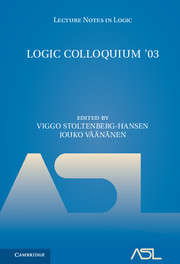Book contents
- Frontmatter
- Contents
- Introduction
- Colloquium Program
- TUTORIAL
- RESEARCH ARTICLES
- Indestructibility and strong compactness
- Some applications of regularmarkers
- Has the continuumhypothesis been settled?
- Geometry of interaction IV: the feedback equation
- On local modularity in homogeneous structures
- Descriptive set theory and uncountable model theory
- Decidable properties of logical calculi and of varieties of algebras
- Stabilization — an alternative to double-negation translation for classical natural deduction
- Definability and reducibility in higher types over the reals
- Predicativity problems in point-free topology
- Rank inequalities in the theory of differentially closed fields
- Consistency and games— in search of new combinatorial principles
- Realizability for constructive Zermelo-Fraenkel set theory
- On long EF-equivalence in non-isomorphic models
- The theory of is undecidable
- Cocovering and set forcing
- References
Consistency and games— in search of new combinatorial principles
from RESEARCH ARTICLES
Published online by Cambridge University Press: 30 March 2017
- Frontmatter
- Contents
- Introduction
- Colloquium Program
- TUTORIAL
- RESEARCH ARTICLES
- Indestructibility and strong compactness
- Some applications of regularmarkers
- Has the continuumhypothesis been settled?
- Geometry of interaction IV: the feedback equation
- On local modularity in homogeneous structures
- Descriptive set theory and uncountable model theory
- Decidable properties of logical calculi and of varieties of algebras
- Stabilization — an alternative to double-negation translation for classical natural deduction
- Definability and reducibility in higher types over the reals
- Predicativity problems in point-free topology
- Rank inequalities in the theory of differentially closed fields
- Consistency and games— in search of new combinatorial principles
- Realizability for constructive Zermelo-Fraenkel set theory
- On long EF-equivalence in non-isomorphic models
- The theory of is undecidable
- Cocovering and set forcing
- References
Information
- Type
- Chapter
- Information
- Logic Colloquium '03 , pp. 244 - 281Publisher: Cambridge University PressPrint publication year: 2006
References
Accessibility standard: Unknown
Why this information is here
This section outlines the accessibility features of this content - including support for screen readers, full keyboard navigation and high-contrast display options. This may not be relevant for you.Accessibility Information
- 3
- Cited by
